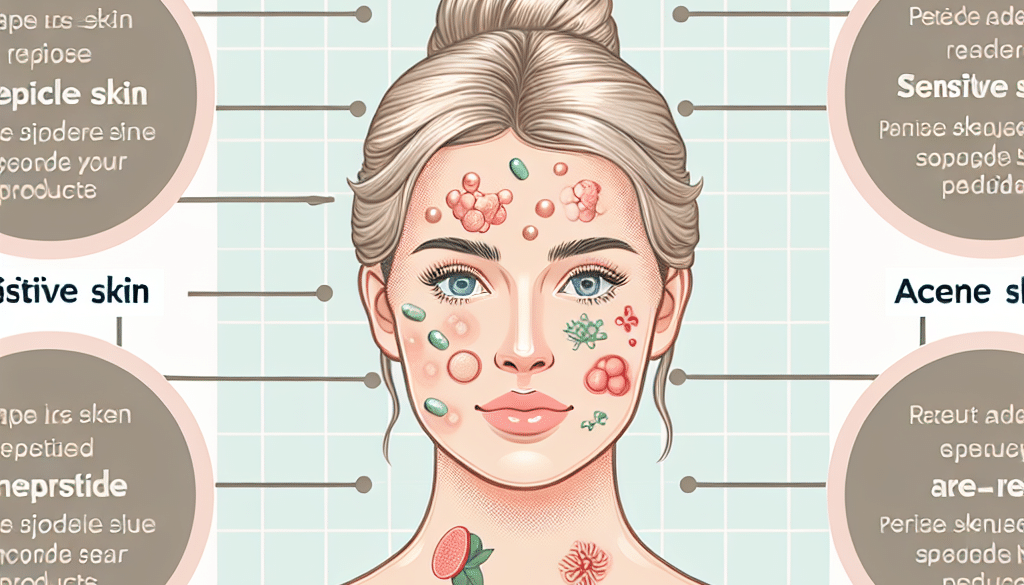Who Should Not Use Peptides On Skin?
-
Table of Contents
- Peptides and Skin Care: Who Should Avoid Them?
- Understanding Peptides and Their Role in Skin Care
- Individuals Who Should Exercise Caution with Peptides
- Understanding the Risks and Side Effects
- Case Studies and Research on Peptide Sensitivity
- Alternatives to Peptides for Sensitive Skin
- Conclusion: Key Takeaways on Peptide Use in Skin Care
- Discover ETprotein’s High-Quality Protein Products
Peptides and Skin Care: Who Should Avoid Them?

Peptides have become a buzzword in the skincare industry, lauded for their ability to rejuvenate skin by stimulating collagen production, reducing wrinkles, and improving skin texture. However, as with any active ingredient, peptides are not suitable for everyone. Understanding who should avoid peptides can help prevent adverse reactions and ensure that individuals use skincare products that are appropriate for their skin type and condition.
Understanding Peptides and Their Role in Skin Care
Before delving into who should not use peptides, it’s important to understand what peptides are and how they function in skin care. Peptides are short chains of amino acids that act as building blocks of proteins such as collagen, elastin, and keratin. These proteins are essential for maintaining the skin’s firmness, elasticity, and strength. When applied topically, peptides can signal the skin to repair itself, leading to a more youthful appearance.
Individuals Who Should Exercise Caution with Peptides
While peptides can be beneficial for many, there are certain individuals who should be cautious or avoid them altogether. Here are some groups who should think twice before incorporating peptides into their skincare routine:
- Those with Sensitive Skin: Individuals with sensitive skin may experience irritation or allergic reactions to peptide-containing products. It’s essential to patch-test any new product and consult with a dermatologist if you have a history of skin sensitivity.
- People with Specific Skin Conditions: Those with certain skin conditions such as eczema, rosacea, or psoriasis should consult with a healthcare provider before using peptides, as they may exacerbate symptoms.
- Pregnant or Nursing Women: Although there is no conclusive evidence that topical peptides are harmful during pregnancy or breastfeeding, it is generally recommended to err on the side of caution and avoid unnecessary skincare actives during this time.
- Individuals on Certain Medications: If you are on prescription skincare medications, particularly those that affect skin turnover like retinoids, it’s important to check with a healthcare professional before adding peptides to your regimen to avoid potential interactions.
Understanding the Risks and Side Effects
While peptides are generally considered safe, they can cause side effects in some individuals. These may include skin irritation, redness, itching, and rash. In rare cases, more severe reactions can occur. It’s important to be aware of these potential risks and to monitor your skin’s response to peptide products.
Case Studies and Research on Peptide Sensitivity
Research on the effects of peptides on the skin is ongoing, and case studies have shown that while many people benefit from their use, some experience adverse reactions. For example, a study published in the Journal of Cosmetic Dermatology reported that some subjects experienced skin irritation when using a peptide-containing serum. Such findings underscore the importance of individualized skincare and the need for further research.
Alternatives to Peptides for Sensitive Skin
If you fall into one of the categories of individuals who should avoid peptides, there are alternative ingredients that can be beneficial for the skin without the risk of irritation. These include:
- Hyaluronic Acid: For hydration without irritation.
- Niacinamide: To improve skin texture and tone while being gentle on the skin.
- Ceramides: To strengthen the skin’s barrier and protect against environmental stressors.
Conclusion: Key Takeaways on Peptide Use in Skin Care
In conclusion, while peptides can offer significant benefits for skin health and appearance, they are not suitable for everyone. Individuals with sensitive skin, specific skin conditions, pregnant or nursing women, and those on certain medications should approach peptide use with caution or avoid them altogether. It’s always best to consult with a dermatologist before incorporating new active ingredients into your skincare routine.
For those who cannot use peptides, there are many gentle yet effective alternatives that can help maintain healthy skin. Remember, the goal of skincare is to support your skin’s health in the most suitable way for your individual needs.
Discover ETprotein’s High-Quality Protein Products
If you’re looking for top-notch protein products for your health and wellness needs, consider ETprotein. They offer a wide range of organic bulk vegan proteins and L-(+)-Ergothioneine (EGT) suitable for various industries, including cosmeceuticals. Their products are characterized by a neutral taste, non-GMO, allergen-free attributes, and high purity levels, making them an excellent choice for those seeking quality and reliability.
About ETprotein:
ETprotein, a reputable protein and L-(+)-Ergothioneine (EGT) Chinese factory manufacturer and supplier, is renowned for producing, stocking, exporting, and delivering the highest quality organic bulk vegan proteins and L-(+)-Ergothioneine. They include Organic rice protein, clear rice protein, pea protein, clear pea protein, watermelon seed protein, pumpkin seed protein, sunflower seed protein, mung bean protein, peanut protein, and L-(+)-Ergothioneine EGT Pharmaceutical grade, L-(+)-Ergothioneine EGT food grade, L-(+)-Ergothioneine EGT cosmetic grade, L-(+)-Ergothioneine EGT reference grade and L-(+)-Ergothioneine EGT standard. Their offerings, characterized by a neutral taste, non-GMO, allergen-free attributes, with L-(+)-Ergothioneine purity over 98%, 99%, cater to a diverse range of industries. They serve nutraceutical, pharmaceutical, cosmeceutical, veterinary, as well as food and beverage finished product distributors, traders, and manufacturers across Europe, USA, Canada, Australia, Thailand, Japan, Korea, Brazil, and Chile, among others.
ETprotein specialization includes exporting and delivering tailor-made protein powder and finished nutritional supplements. Their extensive product range covers sectors like Food and Beverage, Sports Nutrition, Weight Management, Dietary Supplements, Health and Wellness Products, and Infant Formula, ensuring comprehensive solutions to meet all your protein needs.
As a trusted company by leading global food and beverage brands and Fortune 500 companies, ETprotein reinforces China’s reputation in the global arena. For more information or to sample their products, please contact them and email sales(at)ETprotein.com today.












